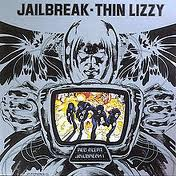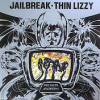 Originally published by L.S. Media. February 2nd 2011.
Originally published by L.S. Media. February 2nd 2011.
For those that lived through 1976, the time came to remembered for the heat wave that struck Britain culminating in drought conditions unseen for generations, it was also noted for the then Chancellor of the exchequer Dennis Healy applying to the I.M.F for a loan of 5.3 Billion Dollars to help bail out Britain and the death of the Peoples Republic of China leader Mao Zedong. In the world of rock music it was the coming of age of a band that had threatened to become one of the biggest recording acts of the decade.
Thin Lizzy and especially the charismatic figure of Phil Lynott had struggled to get their unique brand of music across to a mainstream and record buying public in Britain with only one of their previous albums charting and even that didn’t trouble the other artists that were dominating the air waves at the time. However with the release of Jailbreak, Thin Lizzy seemed to hit a new found confidence that had been evident on the recording of Whiskey in the Jar four years earlier.
As with that single, Jailbreak became an overnight success that had taken months of planning and writing to create. Originally conceived as a concept album, the cover alone betraying the thought patterns that were being played about with at the time, the band soon discovered that the collection of songs they had didn’t fit quite as snug as they may have conceived.
The album opens in some style with the title track and the futuristic idea that the band was showing on the front of the album’s cover came crashing through stereo speakers though out the length and breadth of the British Isles. Scott Gorham, Brian Robertson, Brian Downey and of course Phil Lynott were vindicated in the approach to the album, and in these times of fluctuating commerciality and changing tastes how refreshing to note how the record company stood by this band as they watched years of pain and instability finally bear fruit as the band reached the album top ten for the first time.
The band for the first time had two consecutive top forty hits and for the young Phil Lynott it became a personal triumph. Their next album, Johnny the Fox would see the accomplishment continue as the album reached number 11 and spawn two more top twenty singles.
Within a decade the dream was over as the newspapers and television programmes were full of the early and senseless death of one of Ireland’s and West Bromwich’s modern day heroes. Ten years after releasing arguably the best studio album to have come from the band, Phil Lynott had become a shadow of his former greatness and it was greeted with despair that one of rock’s own bright children had died at the tender age of 36. His last few years had seen the once great man reduced to drug dependency and being a collaborator on friend’s records but nothing would touch the heights, musically or as lyrically interesting of Jailbreak again.
Ian D. Hall
